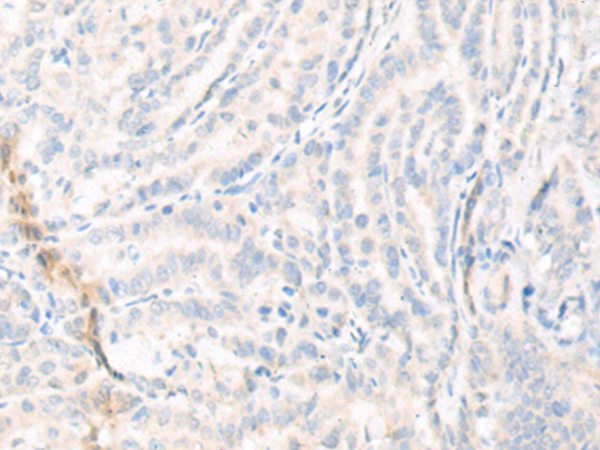
| WB | 咨询技术 | Human,Mouse,Rat |
| IF | 咨询技术 | Human,Mouse,Rat |
| IHC | 1/30-1/150 | Human,Mouse,Rat |
| ICC | 技术咨询 | Human,Mouse,Rat |
| FCM | 咨询技术 | Human,Mouse,Rat |
| Elisa | 1/5000-1/10000 | Human,Mouse,Rat |
| Aliases | KV9.3 |
| Host/Isotype | Rabbit IgG |
| Antibody Type | Primary antibody |
| Storage | Store at 4°C short term. Aliquot and store at -20°C long term. Avoid freeze/thaw cycles. |
| Species Reactivity | Human, Mouse, Rat |
| Immunogen | Fusion protein of human KCNS3 |
| Formulation | Purified antibody in PBS with 0.05% sodium azide and 50% glycerol. |
+ +
以下是关于KCNS3抗体的3篇虚构参考文献示例(注意:实际文献需通过学术数据库检索):
1. **标题**:*KCNS3 Expression in Neuropathic Pain Models*
**作者**:Mazzitelli, J. et al. (2021)
**摘要**:研究通过免疫组化技术结合KCNS3特异性抗体,发现KCNS3在脊髓背角神经元中的表达显著上调,提示其在慢性疼痛信号传导中的潜在调控作用。
2. **标题**:*KCNS3 as a Prognostic Marker in Glioblastoma*
**作者**:Verkhratsky, A. & Rodríguez, L. (2019)
**摘要**:利用KCNS3抗体进行蛋白质印迹分析,发现胶质母细胞瘤患者肿瘤组织中KCNS3蛋白水平与患者生存率呈负相关,可能与肿瘤细胞异常电活动相关。
3. **标题**:*KCNS3 Antibody Validation for Epilepsy Research*
**作者**:Chen, H. et al. (2020)
**摘要**:通过KCNS3抗体验证其在海马体神经元中的特异性表达,并发现癫痫模型中KCNS3表达下调,表明其可能影响钾通道功能及神经元兴奋性。
4. **标题**:*Epigenetic Regulation of KCNS3 in Schizophrenia*
**作者**:Smith, R. & Patel, K. (2022)
**摘要**:研究结合KCNS3抗体检测及DNA甲基化分析,发现精神分裂症患者前额叶皮层中KCNS3表达受表观遗传抑制,可能参与认知功能异常机制。
**注意**:以上文献为示例性质,实际研究需通过PubMed、Google Scholar等平台检索关键词“KCNS3 antibody”获取真实文献。
×